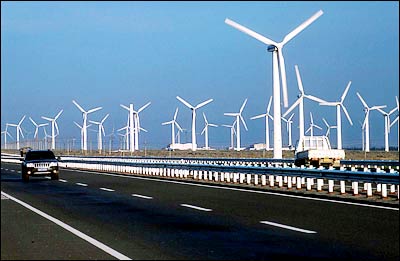The consumption of natural resources, including energy,
minerals, water and land, keeps increasing along with rapid
economic growth. China has made remarkable achievements in economic
and social development over the last 20 years, but is paying an
enormous resources and environmental price. China's mode of
untrammeled economic development is characterized by high rates of
growth, resource consumption and of pollution. At present, the
consumption of energy, raw materials and water resources per unit
of GDP is much higher than the world average; waste of resources in
production, construction, distribution and consumption is still
serious. Therefore, the Chinese government put forth the key
strategic policy of building an energy-efficient society.
 |
China's Medium and Long-Term Energy Development Program for 2004
- 2020, adopted in principle by the State Council in June 2004,
prioritizes energy conservation, and adjustment and optimization of
the energy structure. China's first Medium and Long-Term Energy
Conservation Plan formulated by the National Development and Reform
Commission was published at the end of 2004. This lays down
specific regulations for indices of energy consumption, covering
thermal power generation, electricity supply and coal consumption,
for major products. By 2010, these indices as a whole will reach or
approach the international advanced level of the early 1990s. By
2010 the energy efficiency of important energy-consuming equipment,
such as coal-fueled industrial boilers, must reach or approach
international advanced level. The indices of some automobiles,
electro-motors and household appliances should also be up to the
international advanced level by 2010. Since 2005, China has started
10 key energy-conservation projects, such as the Transformation of
Coal-fueled Industrial Boiler and Kiln, Development of Regional
Combined Heat and Power (CHP) Plants, Energy Conservation of
Electric Machinery, Green Lighting, Petroleum Conservation and
Substitution, Waste Heat Utilization, Energy Conservation in
Construction and Energy Conservation in Government Departments. It
is estimated that by 2010 these projects will save the energy
equivalent of 240 million tons of standard coal.
The general requirements for building an energy-efficient
society are: paying equal attention to resource development and
conservation, with conservation as the guiding principle, putting
resource saving and greater utilization efficiency at the heart of
things; emphasizing conservation of energy, water, materials and
land, the comprehensive utilization of resources and the
development of a recycling economy, establishing energy-efficient
modes of production, consumption and of urban and rural
construction.